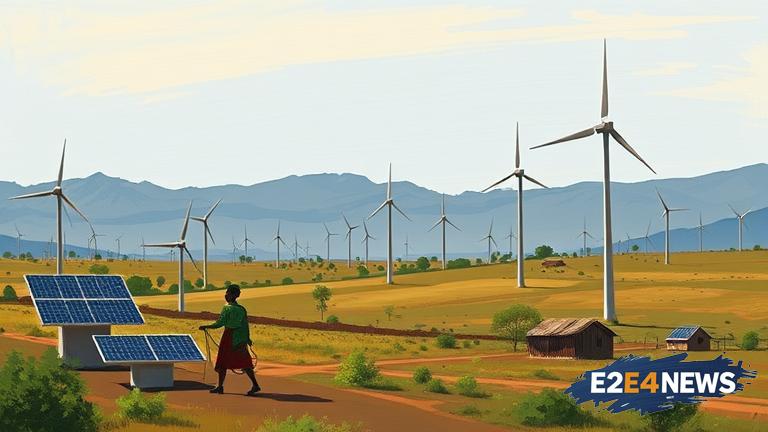Africa is undergoing a significant transformation in its energy landscape, with a growing focus on renewable energy sources. The continent is rich in solar and wind resources, making it an ideal location for the development of renewable energy projects. In recent years, there has been a surge in investment in the renewable energy sector, with many countries committing to increase their use of clean energy. South Africa, for example, has set a target of generating 20% of its electricity from renewable sources by 2030. The country has already made significant progress in this regard, with the development of several large-scale solar and wind farms. Other countries, such as Morocco and Egypt, are also investing heavily in renewable energy, with a focus on solar and wind power. The use of renewable energy is not only beneficial for the environment, but it also has the potential to create jobs and stimulate economic growth. In fact, a report by the International Renewable Energy Agency (IRENA) found that the renewable energy sector could support up to 24 million jobs globally by 2030. Africa is well-positioned to take advantage of this trend, with many countries having an abundance of renewable energy resources. The development of renewable energy projects is also being driven by the need to address energy poverty, with many communities in Africa lacking access to reliable and affordable energy. Renewable energy can help to address this issue, by providing energy to off-grid communities and reducing reliance on fossil fuels. Furthermore, the use of renewable energy can also help to reduce greenhouse gas emissions, which contribute to climate change. Africa is particularly vulnerable to the impacts of climate change, making the transition to renewable energy all the more urgent. In addition to the environmental benefits, the development of renewable energy projects can also have a positive impact on local economies. For example, the development of a wind farm can create jobs and stimulate local economic growth, through the purchase of goods and services from local businesses. The renewable energy sector is also attracting significant investment, with many international companies and investors looking to tap into the continent’s vast renewable energy resources. This investment is helping to drive the development of new renewable energy projects, and is supporting the growth of the sector as a whole. Despite the many benefits of renewable energy, there are still challenges to be overcome. One of the main challenges is the lack of infrastructure, with many countries in Africa lacking the necessary transmission and distribution infrastructure to support the development of renewable energy projects. However, this challenge is being addressed, with many countries investing in the development of new infrastructure. Another challenge is the high upfront costs of developing renewable energy projects, which can make it difficult for some countries to get started. However, the cost of renewable energy is decreasing over time, making it more competitive with fossil fuels. Overall, the future of renewable energy in Africa looks bright, with many countries committed to increasing their use of clean energy. As the continent continues to develop and grow, it is likely that renewable energy will play an increasingly important role in the energy mix. With the right policies and investments in place, Africa can unlock its vast renewable energy potential, and create a more sustainable and prosperous future for all. The development of renewable energy projects is also being driven by the need to improve energy security, with many countries in Africa relying heavily on imported fossil fuels. By developing domestic renewable energy resources, countries can reduce their reliance on imported fuels, and improve their energy security. This can also help to reduce the impact of price volatility, which can have a significant impact on the economy. In conclusion, Africa’s renewable energy revolution is gaining momentum, with many countries committing to increase their use of clean energy. The development of renewable energy projects is being driven by the need to address energy poverty, improve energy security, and reduce greenhouse gas emissions. While there are still challenges to be overcome, the future of renewable energy in Africa looks bright, with many opportunities for growth and development.





